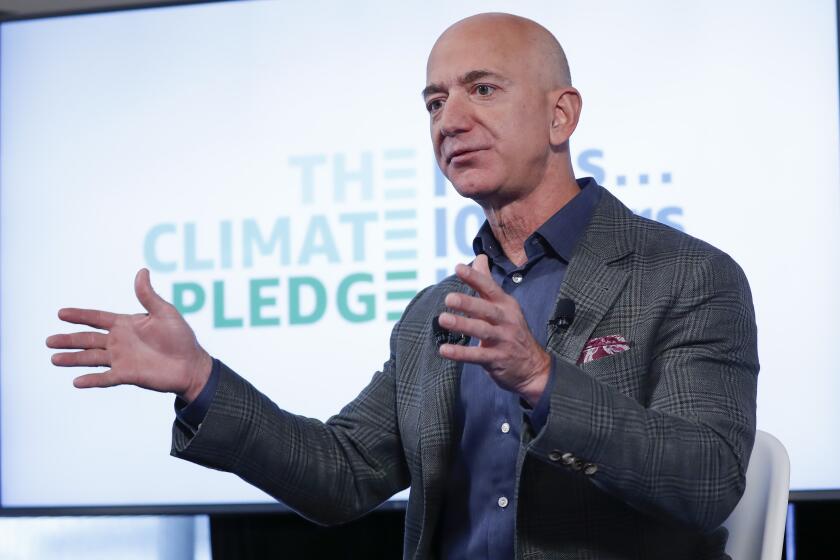Column: Google’s dominance affects us all. Why is its trial being held in secret?

- Share via
The public has been riveted for weeks by the most important federal trial for the tech world in a quarter-century.
The criminal trial of accused cryptocurrency scam artist Sam Bankman-Fried, right?
No, not that. We’re talking about U.S. vs. Google, a massive antitrust trial unfolding in a federal courtroom in Washington, D.C.
Google is their first choice based on legitimate considerations of quality and price. It should be sufficient to say that the antitrust laws do not exist to punish a successful competitor or hold an umbrella over less-efficient rivals.
— Google explains why it thinks customers choose its search engine
Funny thing about that, however. No one is paying much attention to that case for a couple of reasons. To begin with, the arguments on both sides are mind-numbingly technical, seeking to establish whether the deals in which Google is alleged to have cemented its search engine into Apple computers and iPhones and Android smartphones — to such a degree that no other search engine has a prayer of gaining ground — are illegal.
But there’s another, vastly more important reason. Largely at Google’s behest, Judge Amit P. Mehta has conducted much of the trial behind closed doors.
Get the latest from Michael Hiltzik
Commentary on economics and more from a Pulitzer Prize winner.
You may occasionally receive promotional content from the Los Angeles Times.
Since the nonjury trial began Sept. 12 — it’s expected to continue for as much as several more weeks — he has allowed hundreds of crucial documents and countless hours of testimony to be submitted and conducted in secret.
Mehta also refused to allow audio transmission of the proceedings. (Google asserted in court that an audio feed would only be exploited for “clickbait.”)
And with limited exceptions, the judge turned away pleas by news organizations to open more of the proceedings to public view. In September, he ruled that litigants “may” post trial exhibits online. But according to a motion filed Oct. 16 by the New York Times, since he didn’t say they “must” do so, since that ruling “none of the parties has provided consistent access to exhibits used in open court.” (Emphasis in the original.)
Under the circumstances, Google — or Alphabet, its parent company — has already won a significant victory in this case. Even if the judge rules against the company, it has managed to keep crucial information about how it conducts its business out of the public eye.
The lawsuit by the Federal Trade Commission and 17 states shines a light on Amazon’s monopolistic actions that buyers and sellers know all about. But what’s the remedy?
This situation underscores one of the chief failings of the American legal system: It often functions as a private playground for rich litigants.
Wealthy criminal defendants can exploit the bail system to stay out of jail in advance of their trials, while poorer defendants who can’t raise the necessary cash spend pretrial months in stir.
With the connivance of federal judges who wish to keep their dockets pared down, big corporations force aggrieved consumers and workers into arbitration, where the latter are at a disadvantage.
And now this, where a company worth $1.6 trillion can defend its dominance of a huge high-tech landscape while letting the public know only what it wants them to know.

The experience of Microsoft, the last big tech company to face an antitrust prosecution of this magnitude, illustrates what a boon the secrecy is for Alphabet. The earlier case concluded in 2001 with a trial judge’s ruling that Microsoft had illegally monopolized the market for computer operating systems. He ordered the company broken up.
An appeals court overturned the breakup order. The government and Microsoft reached a settlement paring back the company’s ability to impose anticompetitive restrictions on computer makers. But Microsoft’s reputation took a hit from the public’s view of its bare-knuckle tactics and its efforts to gull the court with allegedly falsified evidence.
“One result,” observes consumer advocate Matt Stoller, “was that Microsoft, afraid of public exposure years later, refused to use its control over the browser to kill nascent rivals, in particular a young search company called Google.”
The dwindling cadre of reporters following the trial have to do so in person. They get almost no advance warning of when they’ll be barred from the courtroom for the day. They just have to turn up to find out.
One important witness, former Google executive John Giannandrea, testified in open court for ten minutes on Sept. 21. Then the press and public were excluded and he continued his testimony in secret for another four hours.
Google doesn’t deserve all the blame for this secrecy. The government hasn’t protested the company’s demands to seal documents and testimony — the Department of Justice did post some evidentiary filings online, until the judge ordered that it wait for his approval before doing so again.
Google’s partners in some of the business arrangements the government plaintiffs are challenging, including Apple, have also asked to keep testimony involving them confidential. The judge has generally agreed.
Albertsons says a controversial $4-billion merger dividend is part of its growth strategy. How is taking on debt to funnel money to insiders helping it grow?
Decisions to close a trial from public view, in any event, belong to the judges, and they’re expected to do so only in special cases. Mehta, however, has been criticized for allowing Google effectively to dictate when material falls into the exclusionary category of trade secrets.
“I’m a trial judge,” he said at a pretrial conference this summer. “And so I take seriously when companies are telling me that if this gets disclosed, it’s going to cause competitive harm.”
That brings us to the nuts and bolts of the case. It was initially brought by the Department of Justice in 2020, during the Trump administration, and was eventually consolidated with a similar case brought by several red states that were then campaigning against Big Tech for purportedly discriminating against conservative voices. The plaintiffs’ cadre has greatly expanded, with the addition of 15 blue states, including California.
The main allegation concerns how Google established itself as the default search engine on Apple devices, web browsers such as Opera and Mozilla, and smartphones made by LG, Motorola and Samsung with contracts and financial blandishments that essentially closed off the search market to competitors.
Not even the resurgent Microsoft has been able to breach the wall for the benefit of its search engine Bing, which is mired at about 7% of the search market against Google’s estimated 88%. Bing’s share is so meager that specialized search providers — think Open Table and TripAdvisor — “have little interest in working with Microsoft, except, perhaps, as an after-thought,” according to the plaintiffs’ pretrial brief.
“Because our reliance on Google has actually only increased,” an unidentified representative of one of those providers testified, “Bing ... is kind of not relevant anymore. It has been pushed out.”
Biden searches for an antitrust enforcer who could radically transform the U.S.
The plaintiffs say that Google achieved its dominance partially by relying on the power of the default in guiding consumer behavior. Put simply: Humans being creatures of habit, the vast majority of phone and computer users will stick with the first app pushed at them in any category.
Consequently, Google had made great efforts to become the default search engine on all those devices, making lucrative deals with Apple and the other manufacturers to place its search engine on home pages and browsers. To this day, users of Apple’s Safari browser search the web with Google unless they take deliberate steps to choose an alternative.
Even now, a government lawyer said on the first day of trial, Google spends $10 billion a year to ensure that its search engine remains the default on devices of all kinds. Efforts by competitors to dislodge it have invariably fallen short. In 2018, Microsoft CEO Satya Nadella testified, his company was even willing to drop the “Bing” name from its search engine brand if that would enable it to secure a default slot from Apple. It didn’t work.
The technical arguments raised at the trial turn on whether Google’s arrangements with the device and browser companies are “exclusive” — if so, that would strengthen the plaintiffs’ position that the company engaged in illegal anticompetitive conduct.
Google says in its defense that there’s nothing exclusive about these deals. All its partners are free to offer users alternative choices — the contracts merely make Google the default.
Users of Apple’s Safari, for example, can reconfigure their browser to use Yahoo, Bing, DuckDuckGo, or Ecosia by choosing them from a drop-down menu. Nothing keeps iPhone or smartphone users from installing a widget for any other search engine on their home screen or home page.
Google’s position is that users are making a free choice on the merits. “Google is their first choice based on legitimate considerations of quality and price,” it says in its court filings. “It should be sufficient to say that the antitrust laws do not exist to punish a successful competitor or hold an umbrella over less-efficient rivals.”
Secret meetings, whispered threats -- the price-fixing case against tuna companies sounds like a mafia story.
Even a government witness, economist Michael Whinston of MIT, acknowledged that if all Android smartphone users were given a free choice of search engines upon acquiring their phones, “Google would be selected more than 90% of the time,” as Mehta described his testimony. Whinston estimated the “shift” from Google to other search engines would only be “approximately 1% of all search queries in the U.S.”
Yet that could merely reflect the dominance of Google in consumers’ minds, as evidenced by the evolution of the brand name into a generic term for web searching.
The plaintiffs contend that the ability of users to choose an alternative to Google search is nothing but a smokescreen obscuring its powerful dominance. Given Google’s position, they say, “a monopolist could enter into any contract — no matter its effects on competition — so long as one rival existed and made some feeble attempt to secure the business.” The dominant firm would only continue to get stronger until “it had managed to wipe out all vestiges of present or future competition.”
There’s something to that. Anyone who has tried to change the default search engine on Apple’s Safari to something other than Google knows that it’s not an intuitive process. Nothing on the Safari screen tells the user even where to go to make the choice; you just have to know.
(As a service to readers, on a Mac it’s done by navigating to the Safari tab at the top of the computer screen, choosing “Preferences,” then going to the “Search” tab and finding the options on the drop-down menu. On an iPhone you have to go to the “Settings” icon, scroll down and click on “Safari,” then click on “Search Engine.” Simple, isn’t it? No wonder no one ever does it.)
I’m not an Android user, so for those devices you’re on your own. I’m sure you can Google it.
Whatever happens in this trial, it will happen at a pace that makes an adagio tempo feel like an all-out sprint. The judge isn’t expected to rule until early next year; if he rules against Google, another proceeding will then have to be held to ponder remedies. In the meantime, there will be no getting away from Google or its fellow Alphabet apps, including Gmail, the Chrome browser, Google Play, Google Books and more than I can even count.
Is this good for us as individuals or for our society? Despite their ubiquity, not all these apps are the best available. Chrome is slow, a memory hog, and has been known to snarf up users’ private search data for the company’s purposes. Google search itself has been compromised by the deals its owner has made to steer users to websites belonging to the company’s corporate partners. As I asked back in 2012, after the Federal Communications Commission called it out for privacy violations, “Has Google become too big to trust?”
To ask the question is to answer it, but in case that’s not explicit enough, the answer plainly is yes.
More competition might well drive the company to address these shortcomings for fear of losing users to rivals. But it doesn’t have any competition to speak of. So we’re living in Google’s world, crossing our fingers in the hopes that the company will live up to its original slogan, “Don’t be evil.”
More to Read
Get the latest from Michael Hiltzik
Commentary on economics and more from a Pulitzer Prize winner.
You may occasionally receive promotional content from the Los Angeles Times.















